Thinai Pongal, also known as Foxtail millet pongal, is a nutritious pongal that is made of foxtail millet and moong lentils. This Millet Pongal is wholesome, gluten-free, and vegetarian, and the best part is it can be made in less than 30 minutes.
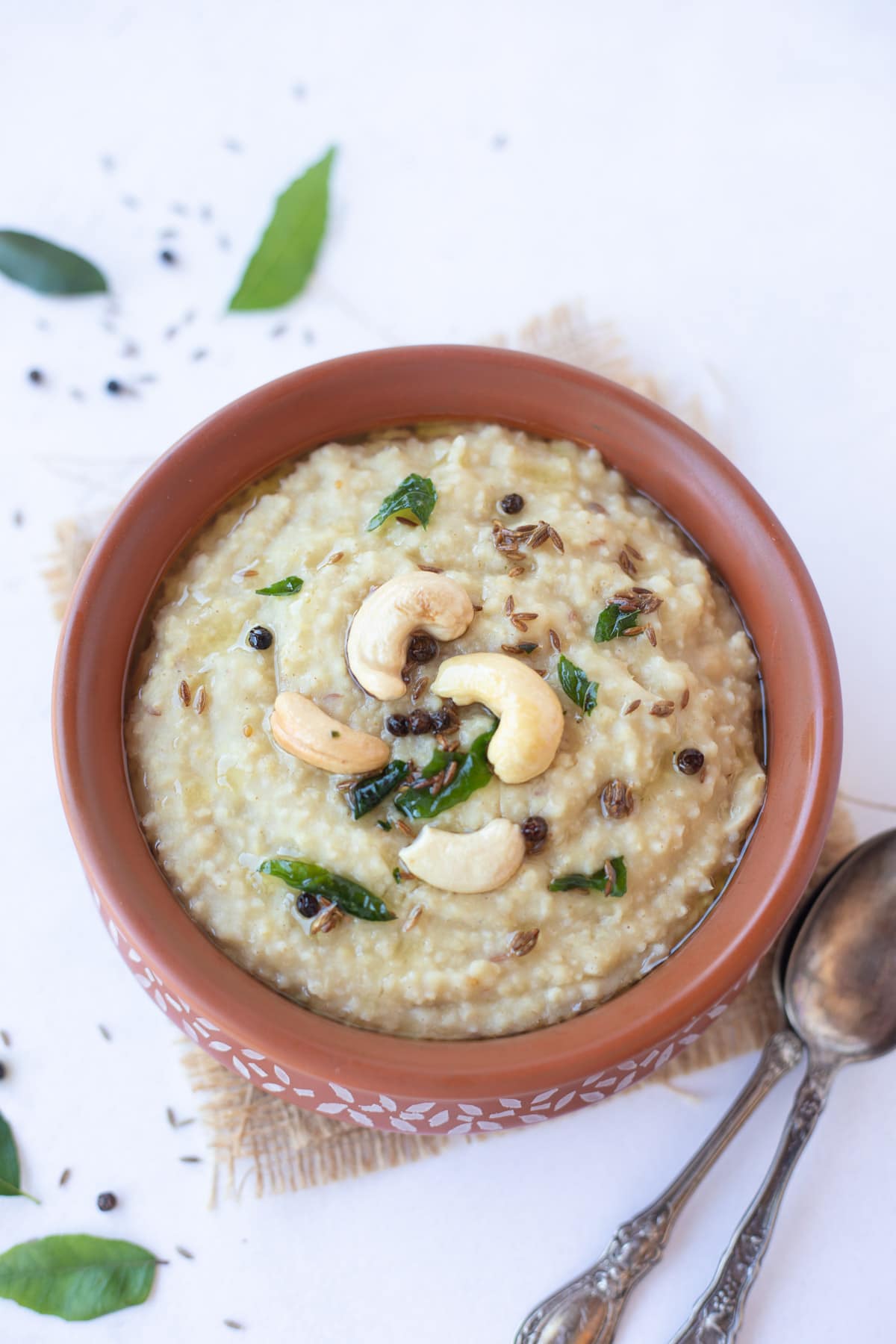
This savory foxtail millet Pongal is a delicious breakfast option and can also be a great lunch or dinner.
Pongal is a South Indian dish that is similar to moong dal khichdi. It’s simple, full of flavor, light on the stomach, and easy to prepare.
Different types of pongals are prepared on the occasion of Pongal, a harvest festival in Tamil Nadu. If you have never tried pongal, be sure to try my Ven Pongal and Sweet Pongal recipes.
If you are new to the South Indian Pongal, it is very similar to Khichdi in North India. Just a little variation in the tempering used, such as the addition of curry leaves and cashews.
I have been on a mission to include nutritious grains, such as millet, sorghum, and buckwheat, into our diet. This recipe for Millet Pongal is a great one to start with if you are new to millet. I have also shared my millet upma recipe that you can try.
I used Foxtail Millets (also called Kangni in India) to make this pongal. But you can also use other millets.
Table of Contents
Watch How to Make Millet Pongal
What Are Millets?
Millet is a cereal grain in the Poaceae family, also known as the grass family. It is widely consumed in Africa and Asia’s developing countries.
While it may appear to be a seed, millet has a nutritional profile similar to sorghum and other cereals.
Millet has grown in popularity in the West due to its gluten-free status and high protein, fiber, and antioxidant content.
What Is Foxtail Millet?
Foxtail millet, scientifically known as Setaria italica is an annual crop grown in arid and semi-arid regions. Historians believe that this gluten-free cereal cultivation dates back 8000 years and that it was widely grown along the Yellow River in China.
The seeds of foxtail millets are small, oval, or elliptical in shape. They are yellow in color. They look similar to yellow mustard seeds. The seed head of this plant resembles a fox’s bushy tail, hence the name Foxtail Millet.
Foxtail millets are also known as Italian millets, but there are different names for it in different Indian languages.
- Hindi/ Punjabi- Kangni
- Tamil – Thinai
- Telugu- Korralu
- Kannada – Navanakki
- Bengali – Kaon dana
Fiber, protein, zinc, and magnesium are all abundant in foxtail millet. It also contains a reasonable amount of iron and calcium.
Ingredients
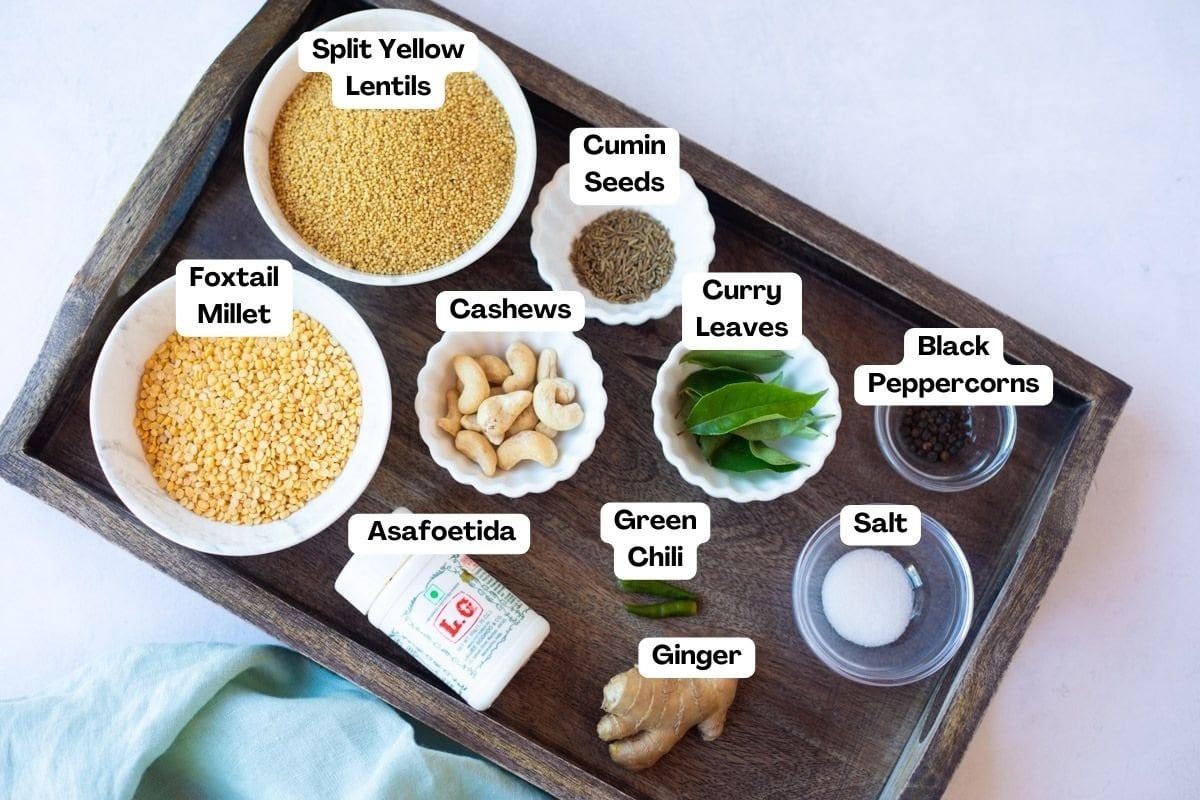
Millet: I used foxtail millet for this recipe, but you can also use little millet, proso, or kodo millet to make this pongal.
Yellow Moong Dal: Use dehusked, split yellow moong dal.
Spices: For this recipe, you need just a few spices – whole black peppercorns, cumin seeds, asafoetida (hing), and salt. You can use crushed black pepper if you don’t want whole black pepper while eating.
Ghee: Adding a generous amount of ghee gives the flavor and aroma of this dish. However, if you are vegan, replace it with a plant-based oil of your choice.
Herbs/ aromatics: ginger, curry leaves, or green chilies. They add lots of flavor to the dish and make it delicious.
Cashew nuts: I like to use cashew nuts. If there are any allergies, you can skip it.
How to Make Millet Pongal?
Instant Pot Method
Switch on the saute mode on your Instant Pot and add the moong dal to it. Roast it until nice and fragrant for a couple of minutes. This is optional, but it adds to the flavor. Remove it.
Add the moong dal and millet to a bowl or strainer and wash them well.
Now to the main steps to cook the millet pongal.
- Start the instant pot in sauté mode and heat the ghee in it. Add cumin seeds, black peppercorns, asafoetida, curry leaves, and cashews.
- Saute till the cashews are lightly roasted. Take out half of the tempering and reserve it for later. Add green chili and ginger.
- When the ginger turns golden brown, add millet and moong dal. Saute for 2-3 minutes.
- Add water and salt. Close the lid with the vent in the sealing position.
- Change the instant pot setting to rice mode, which defaults to low-pressure cooking for 12 minutes.
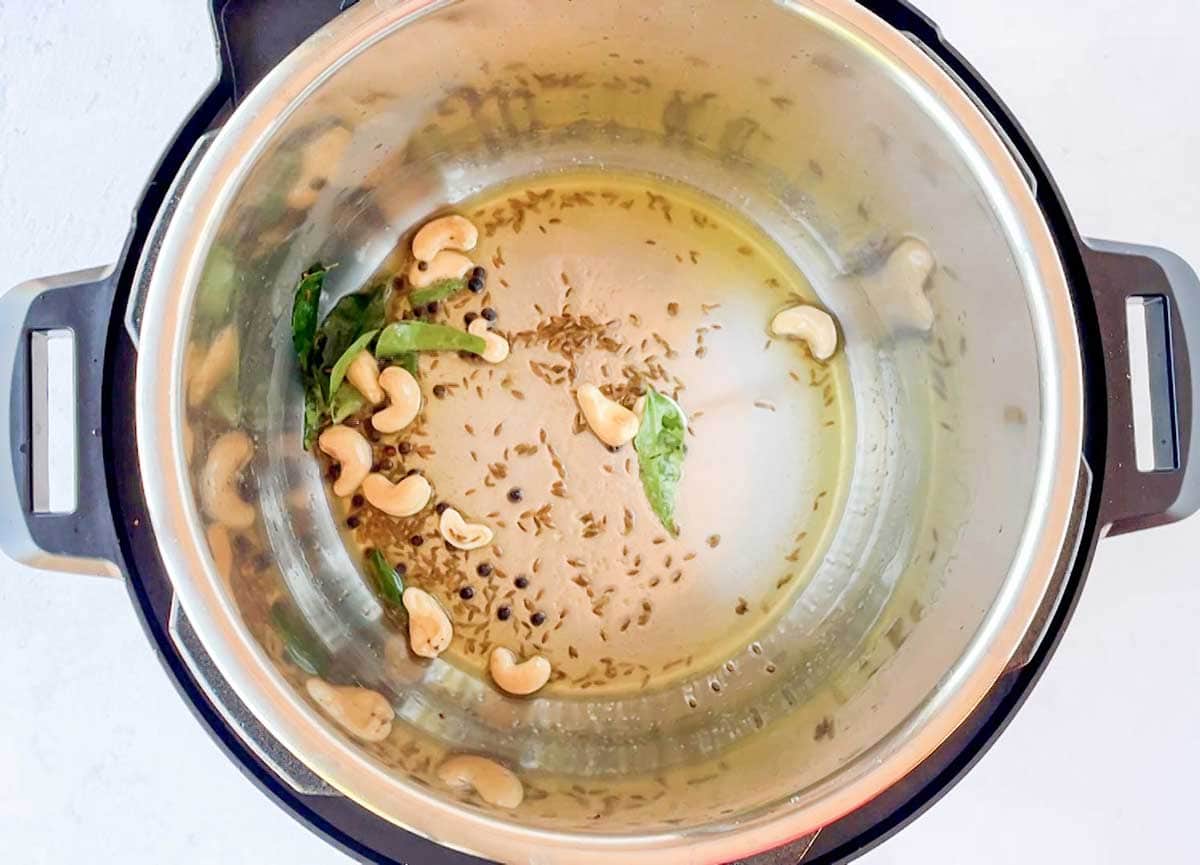
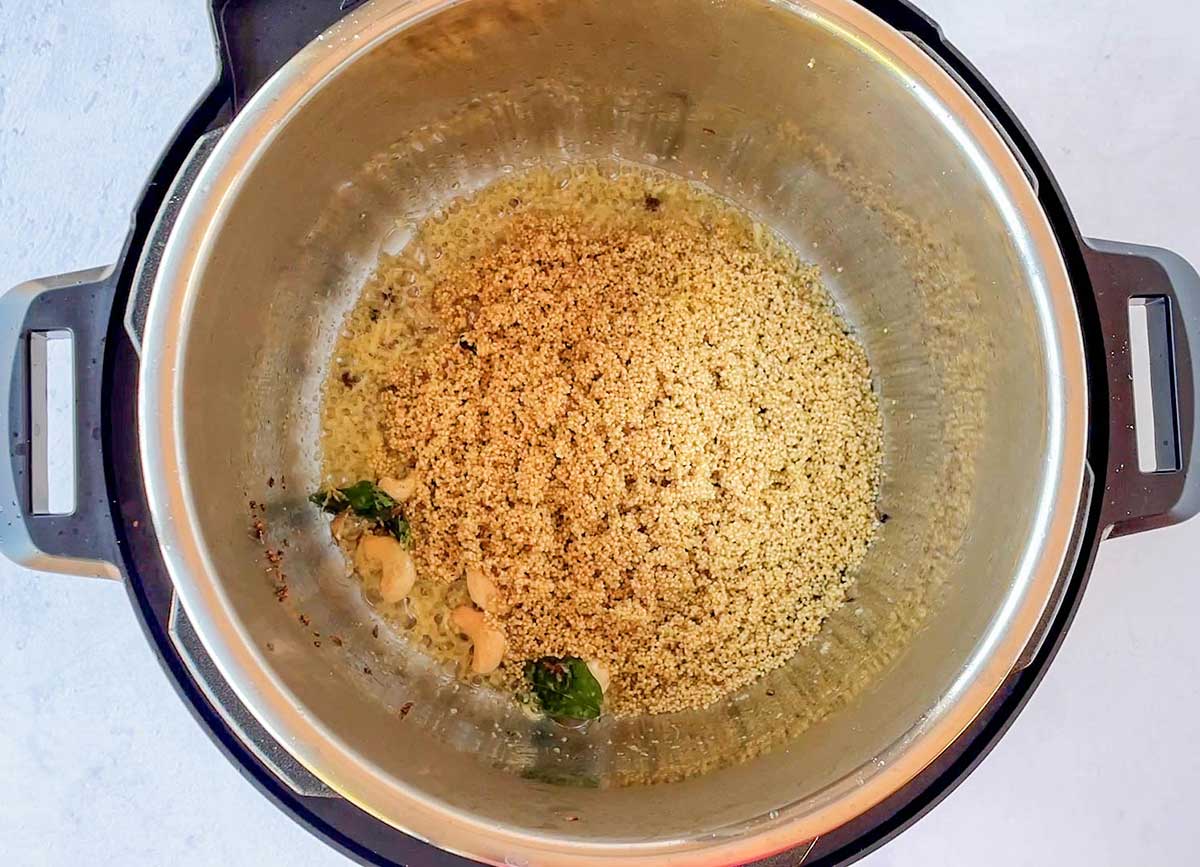
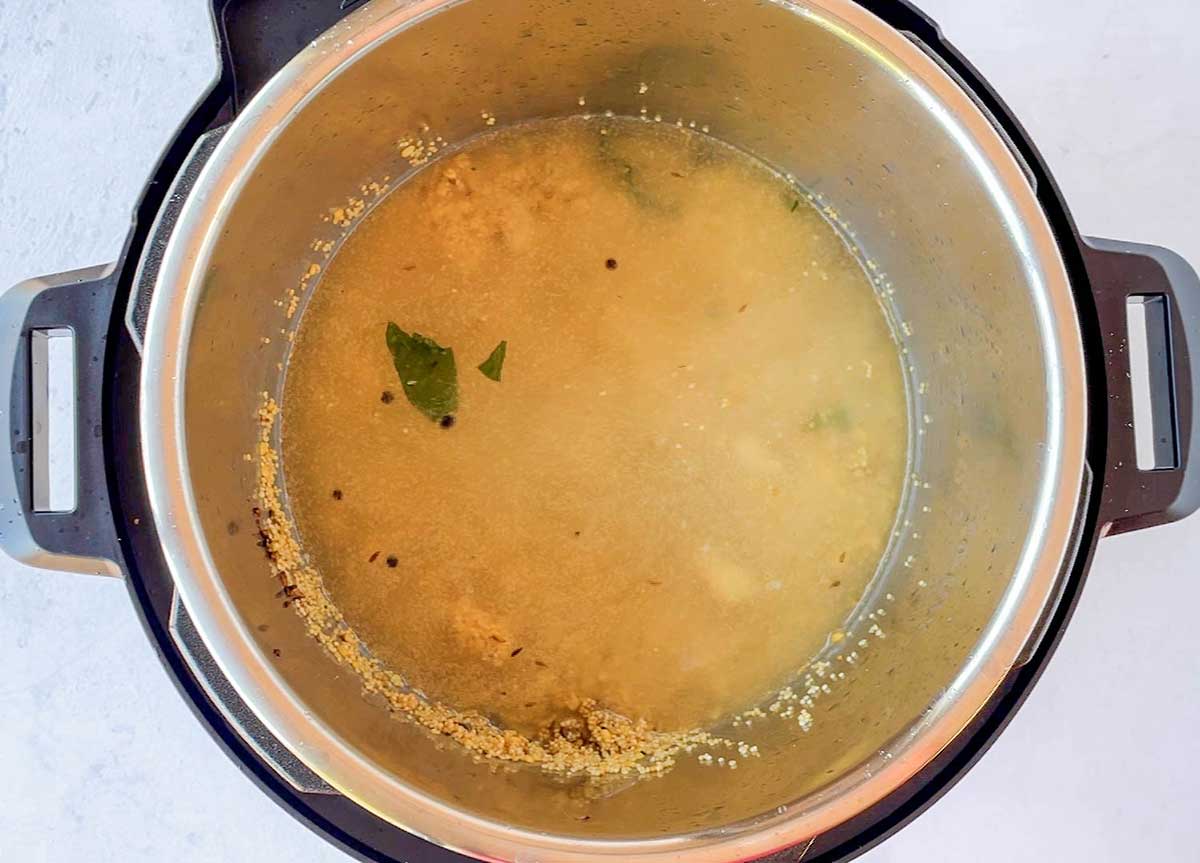
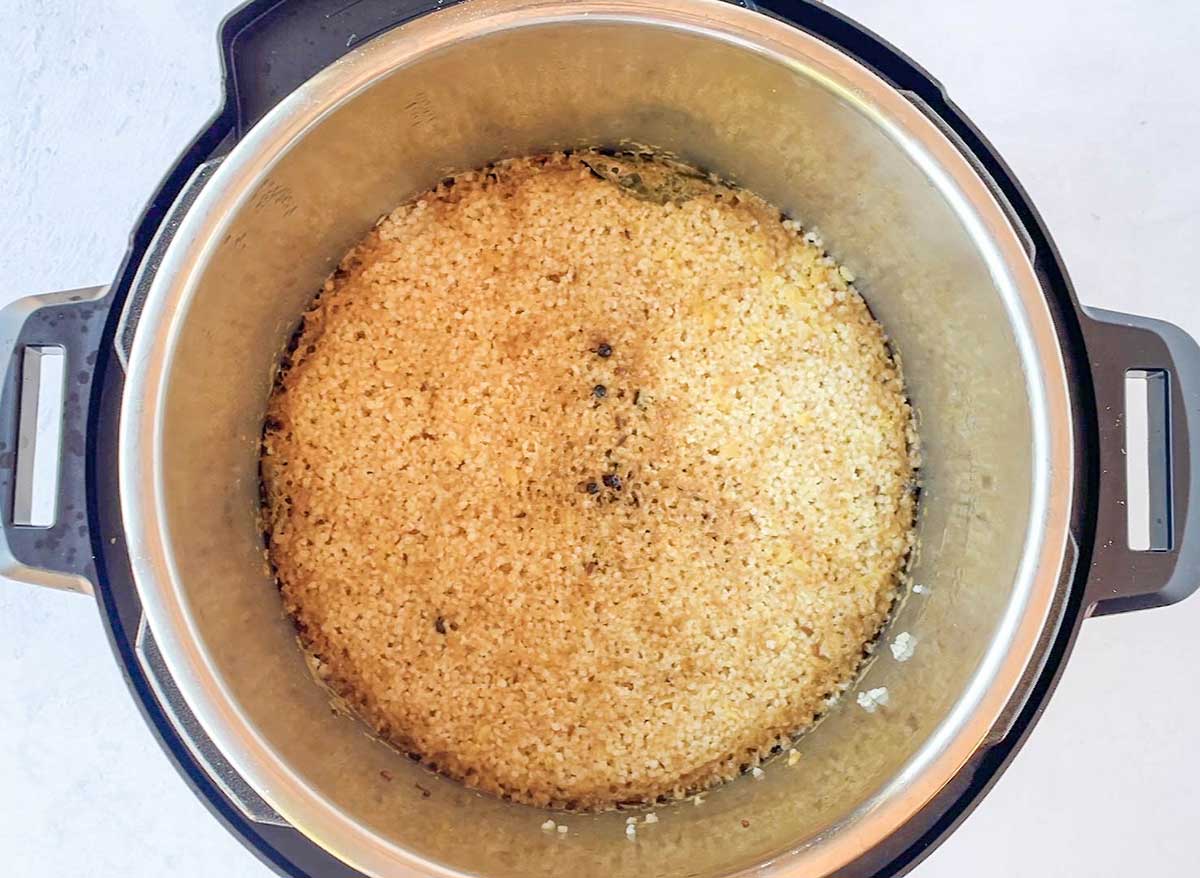
- When the instant pot beeps, let the pressure release naturally for 10 minutes, then manually release the remaining pressure (10-minute NPR).
- Open the instant pot, and the pongal is ready. Give it a good mix. Pour the tempering on top and serve.
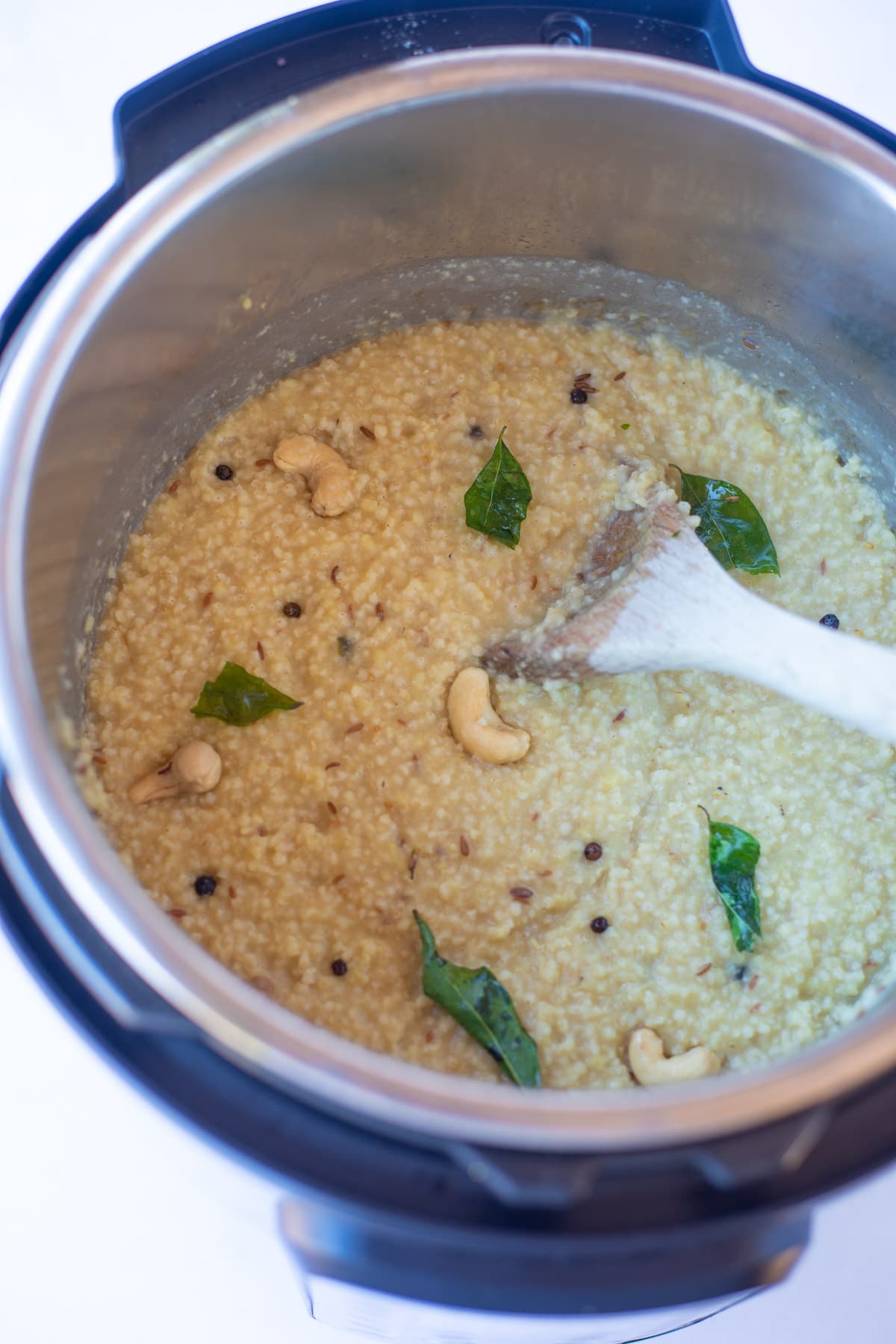
Stovetop Pressure Cooker Method
Roast the dal and then rinse the millet and dal with water.
Pressure cook the dal and foxtail millet along with the water for 3-4 whistles on a medium-high flame. After the pressure is released, check the consistency and add more water if needed.
In a pan on the stovetop, prepare the tempering. Heat ghee, then add cumin seeds, black peppercorns, asafoetida, curry leaves, and cashews, and roast till the cashews are lightly browned. Then add green chili and ginger. When the ginger turns golden brown, the tempering is ready.
Pour the tempering on top of the cooked dal and millet. Mix and simmer for 1-2 minutes.
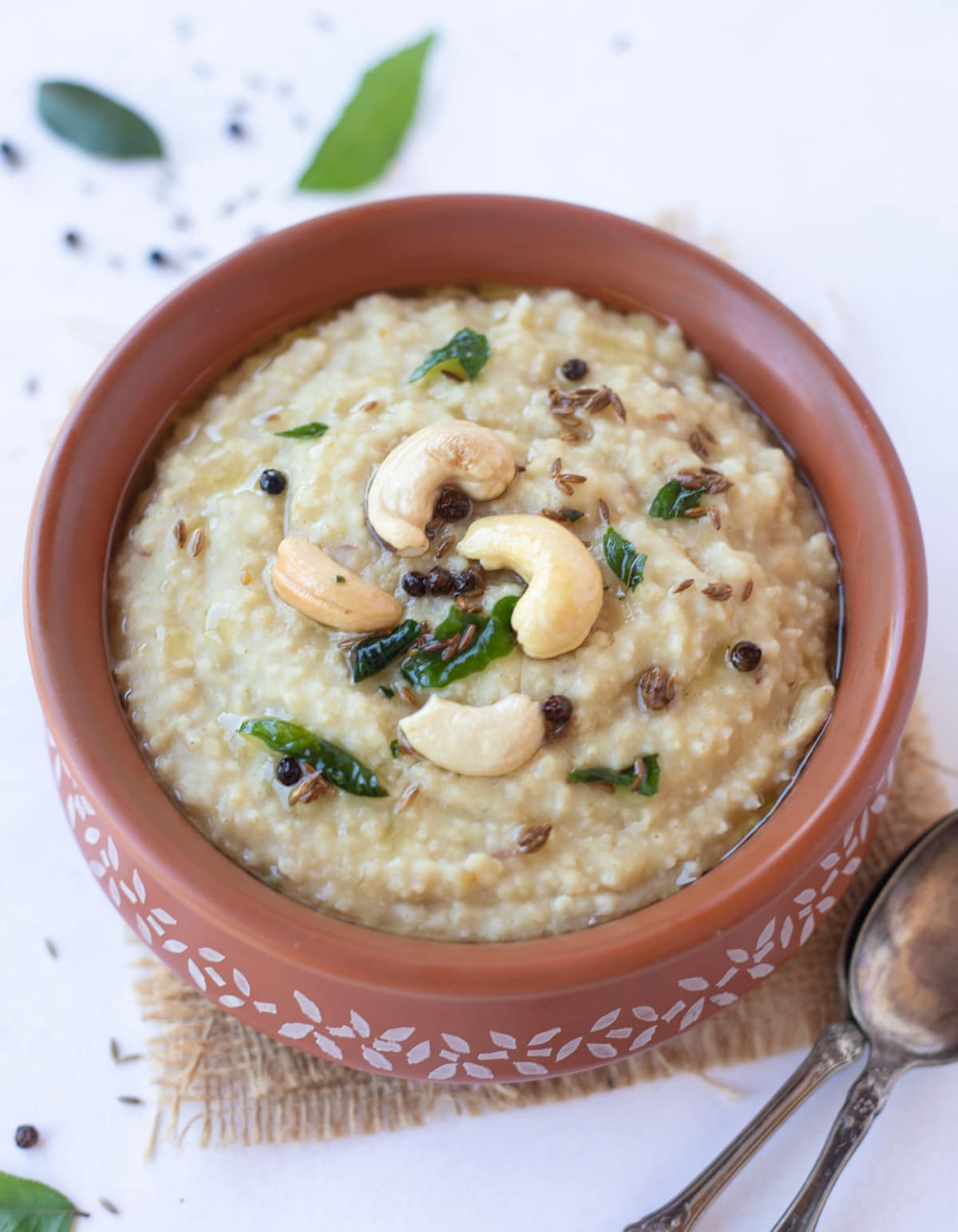
What to Serve with Thinai Pongal?
Thinai Pongal, like Ven Pongal, goes best with a freshly made sambar or rasam.
You can also serve it with coconut chutney or peanut chutney. Pickles like lemon or mango give an extra kick to your pongal.
It goes really well with buttermilk. You can even serve it with Appalam/ papad. If nothing else, just enjoy it with your hot cup of chai!
Recipe Tips
- Before cooking, thoroughly wash the millet 4-5 times.
- Do not combine 2-3 different varieties of millets. Consume no more than one type of millet on the same day. Because it generates more heat in the body, it is critical to stay hydrated throughout the day.
- A good quality and quantity of ghee is essential for making a perfect Thinai Pongal. I like to use homemade ghee.
- If you want your Pongal to absorb the flavor well, lightly crush the peppercorns.
- The water ratio is determined by your preferences. Thinai Pongal has a porridge-like consistency by default, but if you prefer a dry version, simply reduce the amount of water.
- Pongal also gets thicker as it cools down. So add more water if you are enjoying it after some time or if you are reheating the pongal.
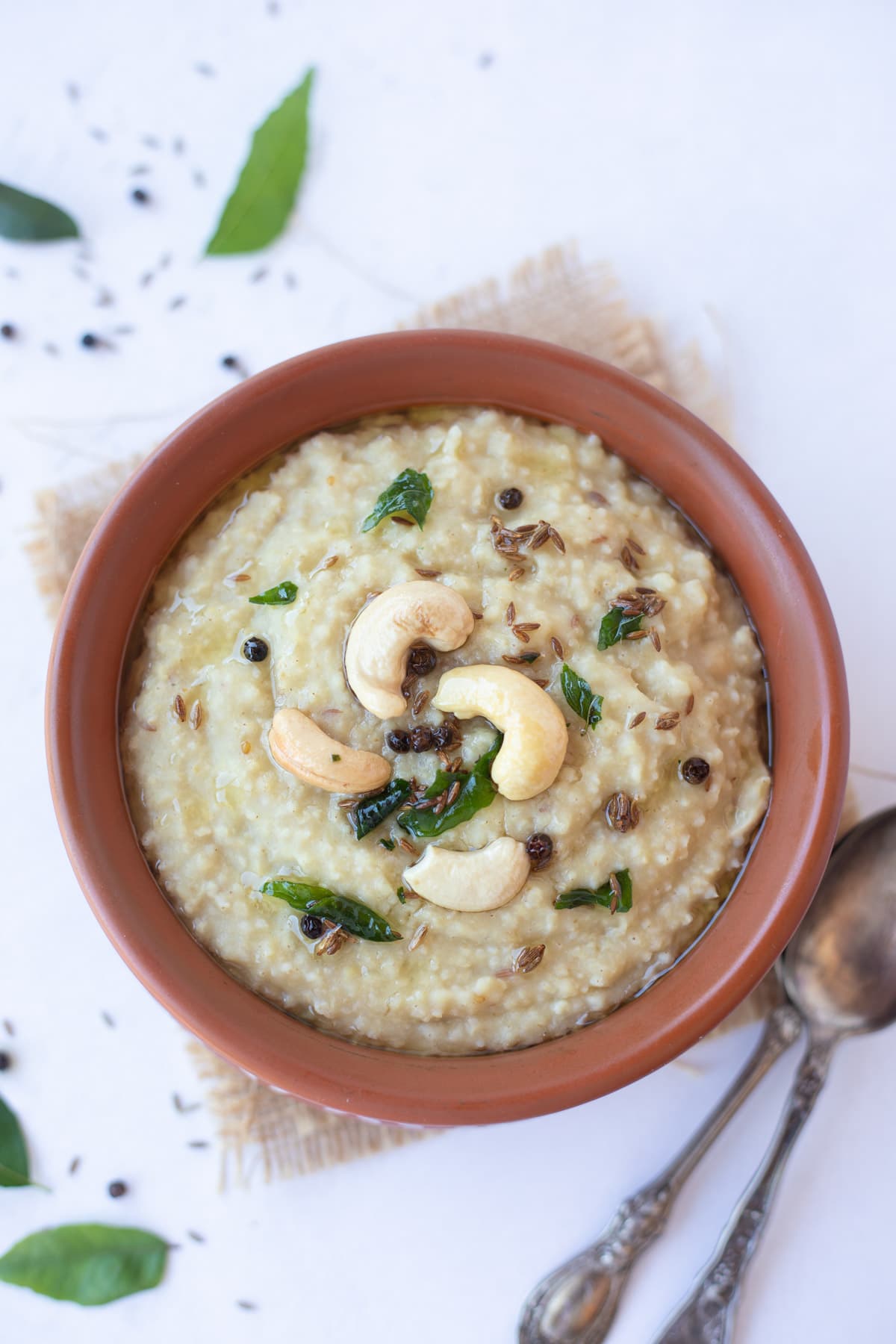
Variations
Here are some options to try different variations of this Millet Pongal:
- Millets: You can use any variety of millet, such as little millet, proso, and kodo millet, to make this Pongal.
- Proportion: Making Thinai Pongal with an equal amount of dal and millet is one way to add variation. The quantity of dal can alter the protein content.
- Vegetables: To make this recipe nutritious, add some vegetables such as green peas, French beans, carrots, spinach, etc., similar to my vegetable khichdi recipe.
- Vegan: The addition of ghee enhances the flavor of Pongal, but vegans can omit it and replace it with any plant-based oil.
- Green Moong Dal: Split green moong dal with husk also works well with this recipe
More South Indian Recipes
Try a few of the other South Indian recipes from our collection:
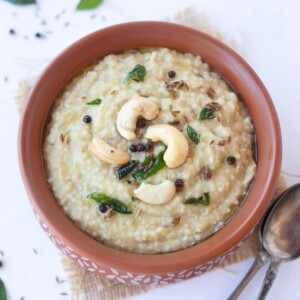
Millet Pongal (Thinai Pongal)
Equipment
Video
Ingredients
- 1 cup Foxtail Millet
- 1/2 cup Split Yellow Lentils (Moong Dal)
- 3 tablespoon Ghee
- 1 teaspoon Cumin seeds (Jeera)
- 1/2 teaspoon Black Peppercorns, whole or lightly crushed
- 1/8 teaspoon Asafoetida (Hing), optional, skip for gluten-free
- 10-12 Cashews
- 10-12 leaves Curry Leaves (Kadi Patta)
- 2 Green Chili Pepper, slit into 2, optional, adjust to taste
- 2 teaspoon Ginger, finely chopped
- 4 cups Water, plus more to adjust consistency
- 1 1/2 teaspoon Salt
Instructions
- (optional) Switch on the saute mode on your Instant pot and add the moong dal to it. Roast it until nice and fragrant for a couple of minutes. Remove it.
- Add the moong dal, millet to a bowl or strainer and wash them well.
- Start instant pot in sauté mode and heat ghee in it. Add cumin seeds, black peppercorns, asafoetida, curry leaves, and cashews.
- Saute till the cashews are lightly roasted. Take out half of the tempering and reserve for later. Add green chili and ginger.
- When the ginger turns golden brown, add millet and moong dal. Saute for 2-3 minutes.
- Add water and salt. Close the lid with the vent in the sealing position. Change the instant pot setting to rice mode, which defaults to low pressure cooking for 12 minutes.
- When the instant pot beeps, let the pressure release naturally for 10 minutes, then manually release the remaining pressure (10 minute NPR).
- Open the instant pot and serve pongal. Give it a good mix. Top with reserved tempering with roasted cashews. Enjoy hot with sambar and chutney!
Traditional Stovetop Method
- Follow the steps to roast the dal and then rinse millet and dal with water.
- Pressure cook the dal and millets along with the water for 3-4 whistles on medium-high flame. After the pressure is released, check consistency and add more water if needed.
- In a pan on stovetop, prepare the tempering. Heat ghee, then add cumin seeds, black pepper, asafoetida, curry leaves, cashews and roast till the cashews are lightly browned. Then add green chili and ginger. When the ginger turns golden brown, the tempering is ready.
- Pour the tempering on top of the cooked dal and millet. Mix and simmer for 1-2 minutes. Pongal is ready to enjoy with sambar and chutney.
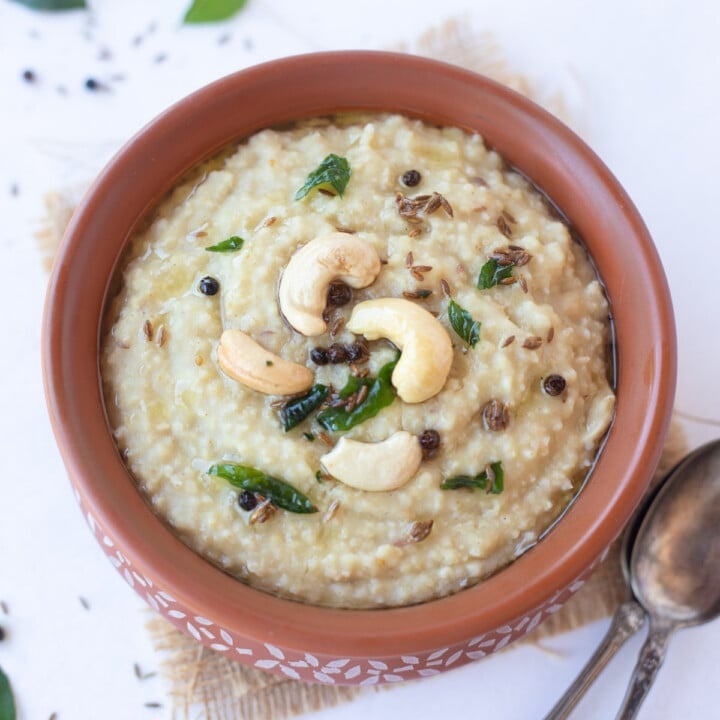

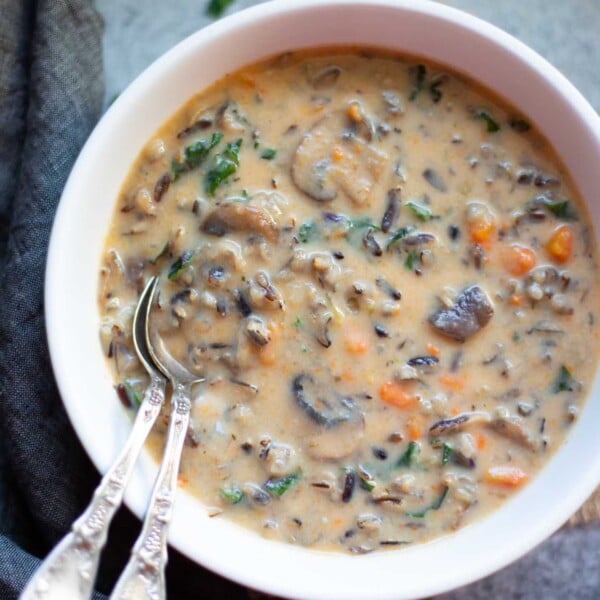
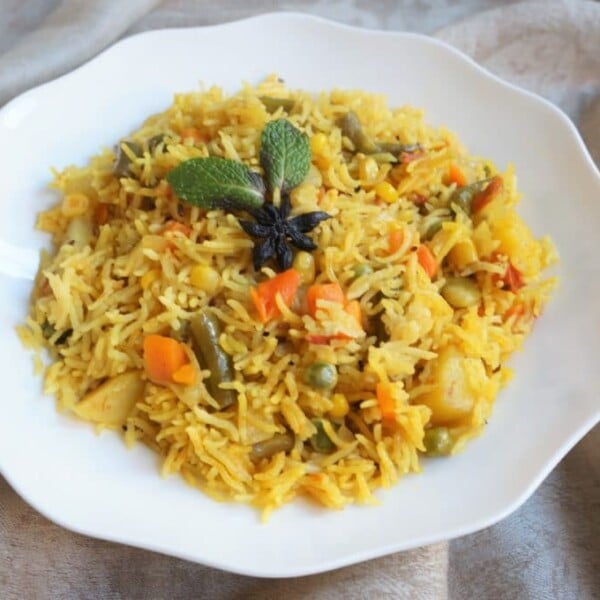
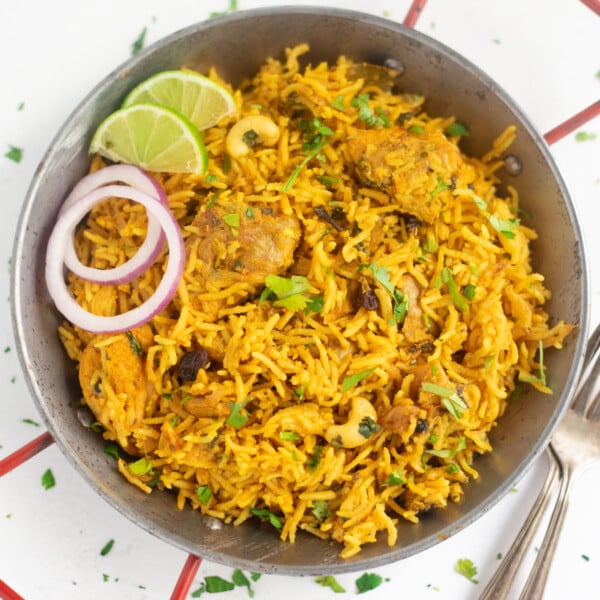
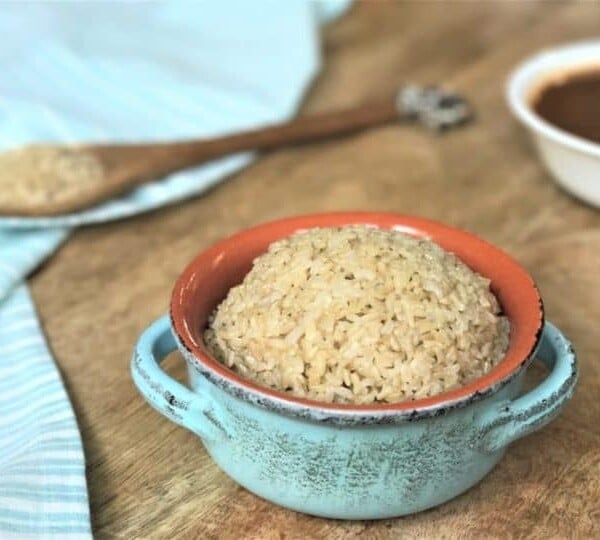








Don’t you need to doak the millets?
I do not soak the millets for this recipe, but you can soak them for 15-30 minutes if you like. The recipe will still work well. I hope you enjoy the millet pongal.
Which brand of millet do you use?
Hi Anjm – I used Himalayan Delight brand foxtail millet.
Hello! Could this recipe be made with finger millet?
Hi Maneesha – I have not tried this recipe with finger millet, so cannot say for sure.